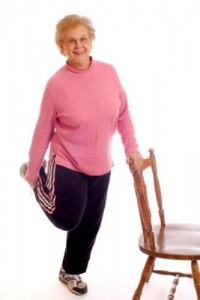 It’s hard to believe that spring is not that far away (as far as the calendar goes). And, also about this time we could all use a ‘kick start’ in our motivation to exercise. For many seniors, the barriers such as chronic health conditions or concerns about injuries or falling discourage them to even think of starting. If an individual has not exercised regularly in the past, they may not know where to begin. Perhaps recurring health problems or disabilities are keeping them from being active or perhaps they believe themselves too old or frail. Frankly, seniors simply do not have the option of not exercising if they want to remain healthy and live longer. Exercise plays a key role in staying strong, being energetic, and staying healthy as we get older. No matter one’s age or their current physical condition, they can benefit from exercise. The rewards of exercise don’t require strenuous, daily workouts or frequent trips to the gym. It’s simply about incorporating more movement and activity into one’s life, often even in small ways. Whether an individual is generally healthy, is managing some illness, or even if they are housebound, there are numerous ways to get the body going and to improve their health.
It’s hard to believe that spring is not that far away (as far as the calendar goes). And, also about this time we could all use a ‘kick start’ in our motivation to exercise. For many seniors, the barriers such as chronic health conditions or concerns about injuries or falling discourage them to even think of starting. If an individual has not exercised regularly in the past, they may not know where to begin. Perhaps recurring health problems or disabilities are keeping them from being active or perhaps they believe themselves too old or frail. Frankly, seniors simply do not have the option of not exercising if they want to remain healthy and live longer. Exercise plays a key role in staying strong, being energetic, and staying healthy as we get older. No matter one’s age or their current physical condition, they can benefit from exercise. The rewards of exercise don’t require strenuous, daily workouts or frequent trips to the gym. It’s simply about incorporating more movement and activity into one’s life, often even in small ways. Whether an individual is generally healthy, is managing some illness, or even if they are housebound, there are numerous ways to get the body going and to improve their health.
Physical Benefits of Exercise for Seniors
- Helps seniors lose or maintain a healthy weight. The metabolism slows with age so maintaining a healthy weight becomes more challenging over time. Exercise increases metabolism and burns calories. When a healthy weight is reached and maintained, the senior’s overall health will improve.
- Reduces the impacts of chronic disease and illnesses. Exercise boosts immune function, aids in heart health and blood pressure, helps achieve better bone density, and aids in digestive functions. Seniors who maintain an active lifestyle are also less likely to suffer from some conditions such as diabetes, heart disease, Alzheimer’s, colon cancer, and osteoporosis.
- Enhances balance, flexibility, and mobility. Exercise improves strength, posture, and flexibility which will in turn improve balance and coordination which can help reduce the risks of falling.
- Improves sleep habits. Quality sleep is important for overall health. Exercise helps the individual to fall asleep more quickly and deeply.
- Good for the brain. Exercise promotes regular brain functions which keeps the brain active. This can prevent cognitive decline, dementia, and memory loss.
The more active seniors become, the more rewards they will reap. It’s important for people to stay positive and motivated about their exercise programs, even if life’s obstacles get in the way of progress. The most important thing to remember is that more activity leads to more energy for fun, enjoyable activities and once it becomes a habit, most seniors will never want to give that up.

